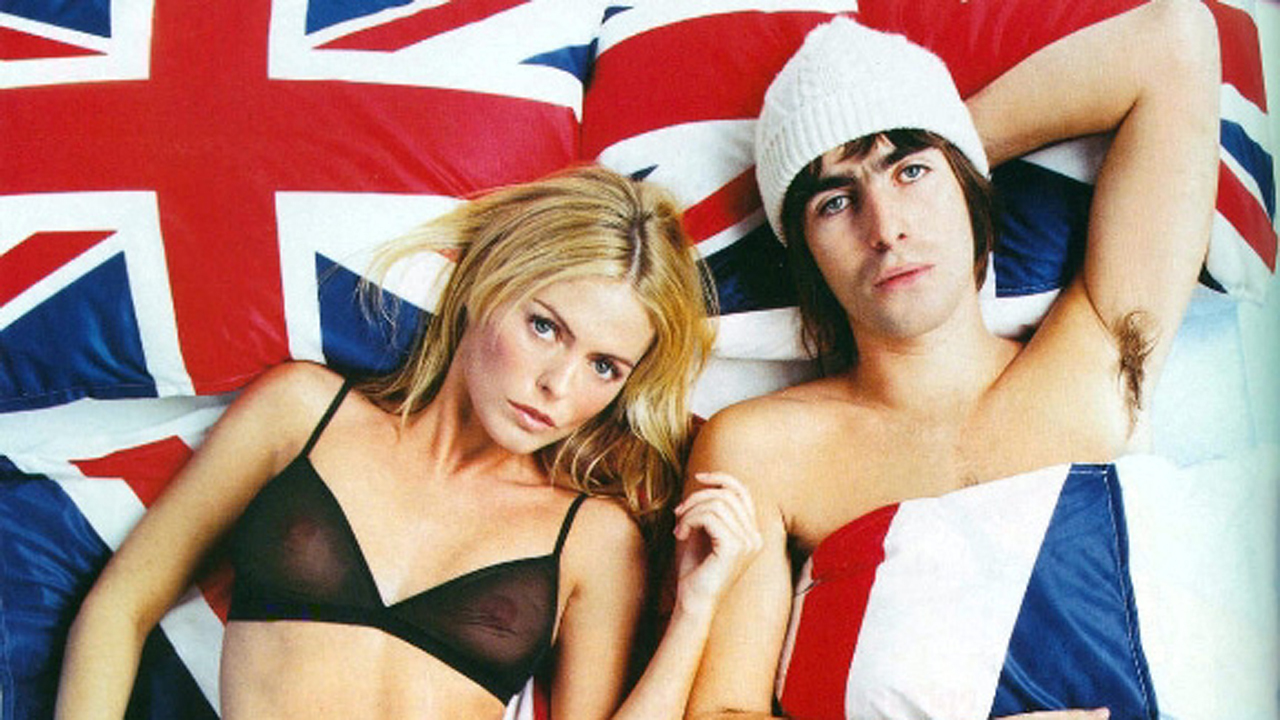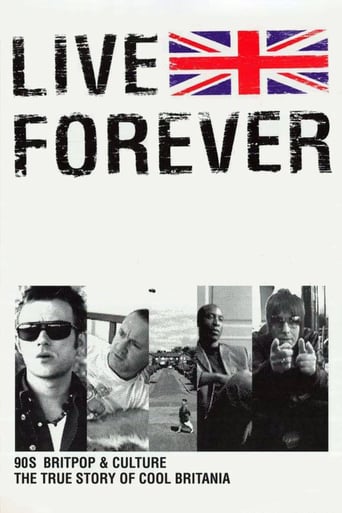

One of my all time favorites.
... View MoreGood concept, poorly executed.
... View Moreif their story seems completely bonkers, almost like a feverish work of fiction, you ain't heard nothing yet.
... View MoreThis is a small, humorous movie in some ways, but it has a huge heart. What a nice experience.
... View MoreProblem #1 - Although the DVD advertises great, original bands like Massive Attack, Portishead, Radiohead et al, we get cheated. This documentary is almost entirely focused on Oasis and Blur. It gets old fast, especially with the Gallaghers acting like first class idiots and Damon Albarn's accent constantly changing from cockney to gentry. Another graduate of the Madonna School for Poser Accents, I see.Problem #2 - What's with the American bashing? In the first 20 minutes, at least 4 different people made the statement that American music was "f--ing rubbish" in the late 80s and early 90s. Right. Nirvana, the Chili Peppers, Tracy Chapman, Sophie B Hawkins, heck even MC Hammer had a fresh sound to represent the Yanks on the pop charts. What about the Smashing friggin Pumpkins? If you think these bands are rubbish, then I can't help you. No one can help you.So are you prepared to listen to a bunch of haters with obvious Yank-envy talk about how they single handedly rescued the music scene from the Americans? If you're a music lover, then by definition you should be somewhat irked by someone bashing other music.Problem #3 - the filmmakers' weak attempt at drawing a correlation between Britain's pop & political scenes. This was probably the most interesting promise of the DVD, but it failed to provide any substance. Just a few wisecracks at Margaret Thatcher and a very random scene of a protest-turned riot.I'm interested in all types of music, if not for the music itself but for its social impact. I've watched and thoroughly enjoyed documentaries from "Standing in the Shadows of Motown" to "Christina Aguilera: Genie Gets Her Wish" to "The Bee Gees: In Our Own Time" to "Anvil! The Story of Anvil" (the best one). What makes each & every one of these documentaries fun is how these musicians, whose talent speaks for itself, come across as funny, odd and thoroughly likable. "Live Forever" made me want to punch a few people.All I learned from this documentary was that in the 90s there were some very jealous & catty British musicians who thought they could do a better job than what was coming out of America. The documentary goes so far as to say they "filled the void after Kurt Cobain died". How pretentious can you get. Oh possibly more than that... The documentary tells us that the fall of Brit pop was a conspiracy by the record companies to capitalize on Princess Di's death. *smacks forehead*In all, this was a total waste of time. Actually there was 1 quote from the movie which was funny and summed up the entire spectacle. A British record promoter speaks about how the public's musical taste is like a pendulum swinging back & forth from American bands to British. Then as an afterthought he adds: "I'm talking about the British public's taste. America couldn't give a toss about what we're doing."That was the only laugh I got out of this supposedly "hysterical" documentary. Sorry, Brit poppers, you can keep your Oasis. I'll stick with the bands that should have been featured but weren't: Portishead, etc. And I might just pull out some of my "f--ing rubbish" American records and pull down the shades so nobody sees.For a sensational music documentary, whether you're a fan of the genre or not, check out "Anvil! The Story of Anvil" ...a shaggy dog story cleverly told with a lot of humor, drama and tons of heart--that's how a musical documentary should be.
... View MoreLive Forever is a worthwile attempt at documenting the interesting post-Thatcher revival in British music exports to the US, labelled as Britpop by the NME and other such music magazines. Previous comments have already highlighted the emphasis that the film places on Oasis, and especially on Noel Gallagher's commentary on the scene and the times, but what else (realistically) could you expect from a film that uses an Oasis song as its title, made by a director that makes no secret of his adoration for the band. Nevertheless, I was shocked to note that the film earmarks a Stone Roses festival gig as the genesis of Britpop, and makes no reference to the debt that the Gallaghers, Liam especially, owe to Shaun Ryder's bands the Happy Mondays and Black Grape.Petty gripes aside, the film makes a clear and unashamed attempt to link the musical revival of Britpop with the revival of the Labour ideology - an easy task when Noel Gallagher is a valued customer at number 10. However, I believe that the political link that the film tries to make is at best tenuous, and at most non-existent. Specifically, Live Forever falls victim to its own hyperbole - that the music, created by youngsters who grew up during Thatcherite rationalisation, was among, if not the most important aspect to the general political and social change that ended God-knows how many years of Tory rule. I believe that the film deflates a little with this argument - it sort of chokes on its own self-importance. As for the rock stars, only Jarvis Cocker comes out of the film with an improved stature. Damon Albarn seems bitter, twisted and fed up (all traits of the archetypal great artist I might add), Noel Gallagher is the original hypocrite as he puts on his best working class whinge while sitting in an antique armchair surrounded by the trappings of newfound wealth, and I won't even bother with Liam.Before I close, I should mention that despite my own whinges, I actually did like this film. It was funny, poignant and affecting in turns, and it dealt with a subject that was very close to my heart. I can only say that I am glad that no mention was made of Radiohead or PJ Harvey.
... View MoreThere`s a saying that " If you don`t read newspapers you`re uninformed. If you do read newspapers you`re misinformed " and that`s the problem I had with LIVE FOREVER , if you`re uninformed about Britpop you`ll be misinformed if you use this as your starting point , dangerously misinformed . The very first caption is from Alistair Campbell needs clarifying : yes in 1996-97 Britain was exporting music ( To the USA )again but this was only down to a select handful of artists namely The Spice Girls , Bush , Elton John , The Prodigy and Radiohead and in no way was this period a golden age for British record exports . Noel Gallagher follows this caption by saying " The eighties were f*** all " - NO THEY WEREN`T . In terms of record sales they were the golden age of British musical export . One week in July 1985 had eight of the top ten acts in the US billboard charts by Brits while 40% of the billboard 100 were by British artists . At the Band Aid concert held the same month each and every act at the London concert was from the British Isles while over 30% of the acts appearing at the JFK stadium were Brits . " The 80s were f*** all " ? I don`t think so Noel The other thing I disliked about this documentary is it`s political bais towards Tony Blair`s New Labour government where we`re force fed Peter Mandelson`s opinions of Mr Blair`s standard of guitar playing ! Completely superflous in my opinion , though there is a bit of irony in all this when Noel Gallagher ( Yes him again ) tells us Oasis songs sum up the 1990s . Yeah well I think Heartland by The The ( Written in 1986 ) sums up Tony Blair`s New Labour government and life in modern Britain perfectly , at least compared to the drinking songs Oasis released , and make no mistake that`s all they are - drinking songs Despite falling international sales British music in the mid to late 90s was far superiour to ten years earlier , but let me just repeat very very few British bands sold any records in the USA at this time which means LIVE FOREVER works only as a nostalgia piece with a good soundrack and not as a historical or cultural document since it leads us to believe Britain was the centre of the musical , cultural and political universe which sadly it isn`t and probably never will be again
... View More"Live Forever" is a brave attempt to document what has come to be known as'Britpop'. Unfortunately, it fails miserably. Most of the 82 minutes running time is devoted to the band Oasis, and the band's frontmen, Noel & Liam Gallagher - is Liam Gallagher that much of a dimwit? While Damon Albarn, and Jarvis Cocker,leaders of Blur & Pulp, respectively, don't get too much of a look in. In fact, after sitting through "Live Forever", you could be forgiven for thinking these were the only bands around.
... View More